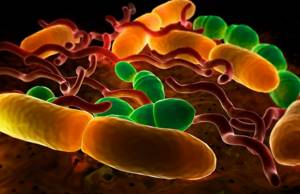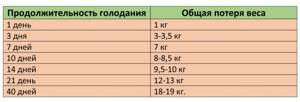What kind of mechanism is this - hunger with the help of water?
Water fasting is one of the popular ways to abstain from food. With this approach, only water is allowed.
When the supply of nutrients is limited or completely absent, the body begins to cleanse itself. Subcutaneous fat is broken down and used as fuel to maintain life.
Read more about losing weight with water in my article here.
In addition to losing weight, abstaining from food has the following positive effects:
- comprehensive rejuvenation through cell regeneration
- strengthening the immune system due to stress on the body
- destruction of pathogenic bacteria due to complex alkalization
Drinking enough water makes the process easier. The kidneys are involved in the work, through which most pathogenic substances are eliminated.

How does the method work?
Fasting decreases the level of leptin in the body, a hormone that suppresses hunger.
Eventually, your body responds by producing more testosterone, which decreases by 1% every year after you turn 30 (so it's definitely a beneficial effect for the body).
To summarize, testosterone levels are something that needs to be monitored and maintained.
However, the surprising fact is that along with the level of testosterone, the level of growth hormone in the body also increases. One study1 showed a 2000% increase in human growth hormone levels when certain fasting intervals were observed.
But this is not the only advantage; Fasting itself is much easier than constantly scheduling meals, which always leaves you stressed out waiting for the next meal.

The eternal question: is water or dry fasting better for weight loss and health?
Both methods are used everywhere. For this reason, each species has its adherents. But which is better?
Practicing naturopathic doctor Mikhail Sovetov is a proponent of water fasting. He explains his point of view as follows:
“Without fluids, it is very difficult for the body to perform basic cleansing. Water has to be extracted from your own cells, destroying them. It is worth taking into account that some of them are a repository for toxins. By gaining access to blood, there is a risk of disrupting the functions of surrounding organs.”
Shchennikov Leonid Aleksandrovich (founder of the school of healing abstinence) holds the opposite opinion. He considers:
“Without access to liquid, the body switches to endogenesis (feeding on its own resources. The process of self-healing and regeneration is activated. The blood is purified, which is very difficult or impossible when drinking water."
Which fasting is best for weight loss? You, dear reader, will have to answer for yourself. I suggest you read reviews from people who are losing weight and what problems they have when not eating.

Contraindications
Therapeutic abstinence from food is not recommended to be used thoughtlessly. Before using any form of fasting, consult your doctor! Improper use of one or another technique can lead to irreparable consequences. We do not take any responsibility for your actions.
From the standpoint of modern medicine, it is prohibited to use water fasting methods for people who have:
- severe underweight
- bright processes of inflammation
- liver cirrhosis, hepatitis
- malignant cancer tumors
- heart muscle beating disorder
- serious blood clots
- chronic kidney disease
You should also abstain in the first months after a myocardial infarction or stroke. Always soberly assess your health and do not neglect contraindications.

Effectiveness for weight loss
Fasting every other day is an extremely effective way to lose weight.
Studies show that after 12 weeks of dieting, body weight decreases by 3-8% or 4.1-6.1 kg.
This type of intermittent fasting is especially effective for people aged 50-59 years. It is in this age group that the greatest results from the diet are observed.
There are no differences in weight changes between men and women.
This diet has been proven to be especially beneficial for people who are obese or overweight. Fasting allows you to reduce the percentage of abdominal fat (the most dangerous) and the concentration of inflammatory markers (CRP, insulin-like growth factor 1) in the blood.
At the beginning of the diet, all subjects experienced severe hunger, which decreased after 2-3 days and completely disappeared on the 5-6th day of fasting. Beginners are advised to start fasting according to the fasting scheme every two days, and then switch to the classic fasting scheme every other day.
According to the Pennington Biomedical Research Center (USA), it is much easier for a person to consume 500 calories during a fast than to give up food altogether. This psychological aspect is extremely important, as it allows you to stick to the technique much longer.
The technique allows you to preserve muscle mass, and only a small number of modern diets can boast of this.
Intermittent fasting 1/1 is an effective way to lose weight. The diet is also easy to follow and there is virtually no loss of muscle mass.
Basic rules for water fasting
Fasting is a process when the body is completely isolated from food. You are only allowed to drink water.
You should spend as much time as possible outdoors. Oxygen enrichment helps cells adapt to internal nutrition and supplies them with everything they need. Don’t forget about moderate physical activity, as this will help:
- don't focus on feeling hungry
- speed up the process of removing toxins and waste
- help the body eliminate mucus
Drink plenty of water. You need to drink 1.5 - 2 liters. With a traditional diet, the body can get moisture from food, so there is less need for fluids. There is no such possibility during fasting.
The water must be distilled. This liquid does not contain salts, which impede the functioning of joints and lead to the development of arthritis, arthrosis and other diseases. If desired, you can purify the distillate with a special mineral - shungite.

Take showers and warm baths. This will open the pores and activate another powerful excretory system - the skin. More information about the principles of recovery from hunger can be found in the book “Fasting is stronger than pills! Healing, cleansing, prolonging the life of the body and strengthening the spirit! Author’s experience + the best of the Bragg, Shelton, Shatalova systems” from Igor Podoprigor. From the book you will learn about the secret methods of fasting from the most famous practitioners in the world, and you will also learn how to correctly apply them on yourself.
Purification during fasting entails only one positive:
| - a starving person will eventually feel years old, 10 younger. What does folk wisdom say? That’s right, “a person is as old as he feels”! - signs of daily fatigue will disappear , and the eyes will finally be freed from the vascular network, which reflects all fatigue, and will begin to sparkle with a healthy shine; - the skin will become clean and velvety, acne and age spots will gradually disappear, leaving behind a smooth surface of the face; - problematic nails that break at the wrong time and thin, split ends will no longer bother you . Fasting for weight loss will solve problems even with these unpleasant moments, restoring your natural beauty; - the liver and kidneys will begin to work like a refined mechanism - a clock, or better, because more than enough energy will be released, and it will be aimed exclusively at improving health; — the sense of smell will become sharper: you can now hear, see, feel everything brighter and more intensely. This means the food tastes better, the world is brighter, conversations are clearer. |
| All of the above can come true, the main thing is to just start therapeutic fasting and the result will come immediately. You should not be afraid of headaches that may bother you at first; this is a kind of protective reaction of the body that will subside over time. The correct approach to fasting and moderation in actions will bring excellent health and significant weight loss. By the way, weight loss during therapeutic fasting will not only be significant, but also effective. All lost kilograms will go away forever , naturally, if you don’t overeat and eat in moderation. After fasting, you can treat yourself to your favorite foods and sweets, but eating small portions will not lead to weight gain. In most cases, therapeutic fasting is easier to tolerate than newfangled diets with far from balanced nutrition. As a result, the effect lasts for a short time, and health is gradually undermined. But no one has ever stopped at just one diet... Willpower is perfectly trained if you use fasting to lose weight - that's a fact! Therefore, it is necessary to carefully study the fasting regimen, which is always standard, and begin self-healing using traditional medicine methods. Therapeutic fasting can last from 24 hours to three to five weeks . |
Popular types of water fasting
It is customary to distinguish between non-eating on liquids according to the timing of its use. The easiest way is to abstain from eating for one day. Of course, such a practice will not bring significant results. It is used to relax the digestive system rather than for weight loss.
But, if you practice regularly for, say, a year, that's already 54 days of fasting! which of course will have an effect in terms of recovery. Longer terms are often used.

Three-day
A 3-day fast is considered a transition period between long-term and short-term abstinence. On the third day, the body begins to switch to endogenous nutrition. However, he does not have time to fully adapt to the new operating mode.
By not eating food for such a short period of time, we train the body and teach it to cope without the supply of nutrients. The intestines are cleansed to a small extent, which promotes weight loss.
Entry and exit should take one day. Throughout the day, it is recommended to give up all animal products and eat mainly raw fruits and vegetables.

Seven days
Giving up food for 7 days is considered a serious experience in a person's life. It is characterized primarily by the appearance of the first acidodic crisis. During this period, chronic diseases become acutely manifest. It usually appears on days 3-5 depending on your health condition.
It is recommended to abstain from food for a week no more than once every six months.
Preparation for practice should take three days.
- Avoiding foods containing animal proteins
- Eliminating processed foods
- Switching to juices and water
When exiting, you should follow the same strategy, starting from the end.
Long-term abstinence of two weeks
If you decide to begin the practice of long-term fasting, first of all you need to be prepared for a second acidotic crisis. It usually appears on the 10th day.
When fasting for 14 days, you should learn to get rid of the obsession with eating something. Most often this is caused not by the body’s need, but by fear and habits. When increasing the practice to 21 days or a month, it is recommended to spend most of the time outdoors. The lack of nutrients should be compensated with oxygen.

During prolonged periods of fasting, the recovery process plays an important role. An approximate daily schedule could be like this:
- Only fruit juices are allowed. It is advisable to start with citrus fruits to activate the taste buds. In the afternoon you can eat 1-2 fruits (orange, apple)
- Include fruit and vegetable salads in your menu.
- Add soups, porridges
- You can start eating grains and legumes
- Nuts are added
- Dairy
- Meat, fish, poultry
How much weight can you lose?,
using the described methods? I suggest you look at the weight loss table:

What is the essence of the technique?

Alternate-day fasting (also known as 1:1 intermittent fasting) is a form of intermittent fasting.
The basic idea is that one day you fast, and the next day you eat whatever you want. And repeat this any number of times.
However, on fasting days you are allowed to drink water, as well as tea or coffee without sugar. And on ordinary days it is allowed to eat any food, but it is still advisable to limit the daily calorie content within the standard values. The option of dry fasting (without drinking liquids) is categorically not recommended.
A modified version of alternate-day fasting is more popular and safer. According to it, on the day of fasting you do not need to completely exclude food, but you should eat about 20-25% of the recommended daily energy value (about 500 calories). At the same time, during the fasting period it is allowed to eat at any time of the day. This does not in any way affect the overall benefits of the diet for the human body.
The founder of the modified version is Dr. Krista Varady from the University of Illinois at Chicago. Under her leadership, a large number of studies have been conducted regarding the effect of this nutritional pattern on the human body.
It is modified fasting with a limitation of daily energy value on a fast day to 500 calories that has a significant evidence base, which we will discuss below.
Thus, 1:1 intermittent fasting is a special type of diet in which days alternate when you are allowed to take any amount of food and days of fasting, when the calorie intake in 24 hours should not exceed 500 calories.
What to remember
Water deprivation is often used by specialists as a way to improve the health of the body. The duration of abstinence can vary, it all depends on your level of training.
Many people try fasting to lose weight. But approach this process with extreme caution. If necessary, consult your doctor.
If you have already tried to lose weight using the above methods, please share your experience in the comments below, I will be grateful to you. Bookmark the blog, we have a lot more delicious things coming up.
See you in the next article!











